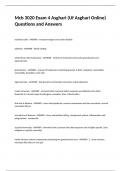Mcb 3020 Exam 4 Asghari (Uf Asghari Online)
Questions and Answers
red blood cells - ANSWER - transport oxygen and carbon dioxide
platelets - ANSWER - blood clotting
white blood cells (leukocytes) - ANSWER - involved in immunity and involve granulocytes and
agranulocytes
granulocytes - ANSWER - A group of leukocytes containing granules in their cytoplasm; neutrophils,
eosinophils, basophils, mast cells.
Agarnulocytes - ANSWER - lack granules and include monocytes and lymphocytes
innate immunity - ANSWER - Immunity that is present before exposure and effective from birth.
Responds to a broad range of pathogens. examples: fever, inflammation
first line of defense - ANSWER - intact skin/epidermis, mucous membranes and their secretions, normal
microbiota (flora)
second line of defense - ANSWER - fever, extracellular killing, complement system, inflammation and
phagocytosis - nonspecific
acquired immunity - ANSWER - Immunity that is present only after exposure and is highly specific. (also
adaptive or specific immunity)
innate immune system components protecting the genitourinary tract - ANSWER - 1. urine removes
microbes (kills them w/ low ph)
,2. hypertonic kidney medulla
3. males: long urethra (UTI more common in females)
4. females: forms lactic acid, inhospitable to microorganisms
macrophages - ANSWER - Found within the lymph nodes, they are phagocytes that destroy bacteria,
cancer cells, and other foreign matter in the lymphatic stream. antigen presenting cells (APCs) = present
antigens to helper T cells
dendritic cells - ANSWER - Antigen-presenting cells, located mainly in lymphatic tissues and skin, that is
particularly efficient in presenting antigens to naive helper T cells, thereby initiating a primary immune
response.
lysosome - ANSWER - An organelle containing digestive enzymes such as lipases, nucleases, proteases,
and lysozome. involved in digesting the microbe once the phagosome fuses with the lysosome.
acquired immune tolerance - ANSWER - The ability to produce antibodies against nonself antigens while
"tolerating" (not producing antibodies against) self-antigens.
skin - ANSWER - dry, cool, salty, low pH, and produces protective secretions. epidermis is top layer of
tightly packed dead cells constantly being regenerated
mucous membranes - ANSWER - found in respiratory, digestive, and urogenital tracts. produce mucous
which cover and protect cells of membrane and can contain special cells that kill invaders before they
enter the body (ex: alveolar macrophages). epithelium: outermost layer of mucous membrane,
constantly regenerates but living cells
respiratory tract - ANSWER - -lined w/ mucus to trap incoming pathogens
-mucus can either be expelled through coughing, eliminating harmful microbes from the body, or
swallowed
-swallowed microbes will enter the stomach, where most are killed by the low pH of 2, and survivors
must compete for resources w/ gut flora in the intestines
, third line of defense - ANSWER - immune response/specific immunity. targets each infection with tailor-
made components. main players are the lymphocytes: B cells, T cells, and natural killer cells
humoral immunity - ANSWER - specific immunity produced by B cells that produce antibodies that
circulate in body fluids
cell-mediated immunity - ANSWER - type of immunity produced by T cells and natural killer cells that
attack infected or abnormal body cells
primary lymphatic tissues and organs - ANSWER - involved in production, maturation and differentiation
of lymphocytes (bone marrow and thymus)
secondary lymphatic tissues and organs - ANSWER - initiate adaptive immune response by binding
antigens
(lymph nodes, spleen, tonsils, lymphoid tissues, Peyer's patches, appendix)
lymph nodes - ANSWER - Bean-shaped filters that cluster along the lymphatic vessels of the body. They
function as a cleanser of lymph as wells as a site of T and B cell activation. "one way street"
spleen - ANSWER - An organ that is part of the lymphatic system; it produces lymphocytes, filters the
blood, stores blood cells, and destroys old blood cells. white pulp contains lymphocytes that filter the
blood. red pulp processes dead red blood cells
fever - ANSWER - increase in temperature by reducing blood flow to skin, resulting in warmer inner core.
pyrogens - ANSWER - fever producing substances that trigger hypothalamus. categories:
1. interleukin-1: produced by body to fight infection
2. bacterial: toxins in bacteria
3. antibody-antigen complexes: immunice complexes result in inflammation + fever




